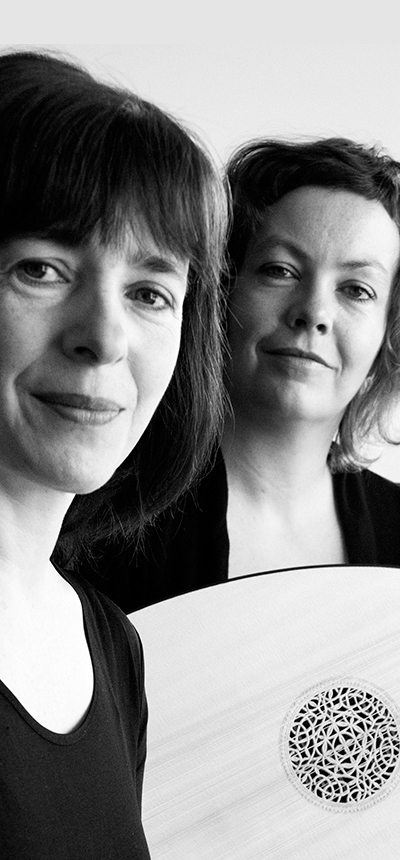
REBECCA OCKENDEN AND SOFIE VANDEN EYNDE
Lute Songs
«The concert given by Rebecca Ockenden and Sofie Vanden Eynde was a pure joy. Their trueness of tone, their apt and finely gauged expression and the radiance of the voice touched our hearts deeply. These two musicians exerted such a spell over us that we could scarcely extricate ourselves from the world into which they had plunged us, simply by the compelling power of their sincerity.»
Love’s Labour’s Lost programme
Crescendo Magazine, Brussels
«This is a lovely disc. Rebecca Ockenden is a soprano, and a very fine one. The singing is excellent, as is the luting. These are demanding songs, pitched quite high, many of them requiring a strong, projected voice, and given here with just the right amount of expressive word-painting. Anyone with an interest in this repertoire needs this disc.»
CD: Mistress Elizabeth Davenant, her Songes
Early Music Review, U.K.
Have you Seene the White Lilly Grow
Previous concerts
| Museumsdag, Bruges, Belgium | So Sounds my Muse |
| Waldaukapelle, Bern, Switzerland | So Sounds my Muse |
| St. George’s, Bloomsbury, London | Love’s Labour’s Lost |
| London Handel Festival | Love’s Labour’s Lost |
| Willebroek, Belgium | Mistress Elizabeth Davenant, her Songes |
| Schloss Schleissheim, Munich | Love’s Labour’s Lost |
| Grachtenfestival, Amsterdam | Love’s Labour’s Lost |
| Festival van Vlaanderen, Belgium | Mistress Elizabeth Davenant, her Songes |
| BOZAR op zondag, Brussels | Love’s Labour’s Lost |
| National Gallery, London | Love’s Labour’s Lost |
| Malle, Belgium | Mistress Elizabeth Davenant, her Songes |
| Villarte, Sint-Truiden, Belgium | Mistress Elizabeth Davenant, her Songes |
| Abendmusiken, Brugg, Switzerland | Love’s Labour’s Lost |
| Wadham College, Oxford | Music for the Petre Family |
| Holywell Music Room, Oxford | Mistress Elizabeth Davenant, her Songes |
| Niklauskapelle, Basel, Switzerland | Mistress Elizabeth Davenant, her Songes |
| Waldaukapelle, Bern, Switzerland | Mistress Elizabeth Davenant, her Songes |
| Leuven, Belgium | Mistress Elizabeth Davenant, her Songes |
| Waver, Belgium | Mistress Elizabeth Davenant, her Songes |
| Diksmuide, Belgium | Love’s Labour’s Lost |
| Ghent, Belgium | Love’s Labour’s Lost |
| Midis-Minimes, Brussels | Love’s Labour’s Lost |
| Sint-Niklaas, Belgium | Love’s Labour’s Lost |
| private concert, Brussels | Love’s Labour’s Lost |
| Klosterkirche Muri, Switzerland | Love’s Labour’s Lost |
| Waldaukapelle Bern, Switzerland | Love’s Labour’s Lost |
| Pianofortino, Basel, Switzerland | Love’s Labour’s Lost |
| Holywell Music Room, Oxford | Love’s Labour’s Lost |
| St.Markus-Kirche, Basel, Switzerland | Love’s Labour’s Lost |
Programmes with Sofie Vanden Eynde:
Love’s Labour’s Lost
Mistress Elizabeth Davenant, her Songes
So Sounds my Muse
Programme with Orí Harmelin:
I am the lute
Love’s Labour’s Lost
Following an upbeat and hopeful opening with Dowland’s Come Away, where the lover entreats his beloved to seize the day, we are greeted by a panoply of rejected lovers and unsuccessful suitors. Overriding is the vision of the ardent male lover receiving an icy reception from his desired lady, each one drawing different conclusions from his experience. However we also have glimpses of frustrated female figures, in the tale of the betrayed Dulcina or in Viola’s monologue from Twelfth Night.
The programme provides the perfect opportunity to observe how timeless these themes are and how melancholy texts and music can have an uplifting, cathartic effect on the listener.
Mistress Elizabeth Davenant, her Songes
We do not know whether the songs were collected by her or for her (for example by her music teacher), but we can assume that they represent the songs of the time which held particular interest for her. Elizabeth Davenant must have been highly educated and cultivated to have appreciated these complex texts and settings.
The manuscript contains 25 songs, mostly of anonymous composition, which range from Campion’s simpler late-Renaissance style to the early baroque declamatory style of John Wilson, more avant-garde in its approach and clearly influenced by the Italian monodists Caccini and Sigismondo d’India.
So Sounds my Muse
She was Lady of the Bedchamber at the Jacobean court and confidante to Queen Anna (wife of King James I), and she danced in many of the court masques. In addition she was the dedicatee of Dowland’s Second Book of Songs and was patron to illustrious poets of the time, including John Donne, Ben Jonson and Samuel Daniel.
The programme is composed of four parts:
- Songs from Ben Jonson’s Masques, composed by Ferrabosco
- John Danyel’s settings of poems by his brother Samuel Daniel
- The first five songs from Dowland’s Second Book of Songs
- Poems by John Donne, set to music by Coprario and Ferrabosco
The programme is completed by solo lute pieces by Dowland and Holborne, poems by John Donne and Ben Jonson, and a letter from Lucy, Countess of Bedford to her good friend, Jane Cornwallis Bacon.
I am the lute
The 17th century lute songs are interspersed with contemporary compositions by Anthony Rooley. In his collection of songs entitled “Orphan Wailings”, his sensitive, touching and, at times, humorous settings of 17th century lyrics have their resonances in the past, but, thanks to their dissonances and rhythmic idiosyncrasies, are very much songs for our age.
A new composition ‘Signe d’Amante’ for lute and voice by Hans-Jürg Meier completes the programme. This takes us definitively into the 21st century and offers a new approach to the writing of lute songs and to the relationship between lute and voice.
The lute remains textually in the centre throughout the programme: the selected poems reflect on the characteristics of the instrument itself, the emotions it gives rise to and the role it plays.
Rebecca Ockenden and Orí Harmelin create an arresting yet intimate atmosphere; the inherent theatricality of the texts inspires a depth of expression and a freedom of movement on the stage.
Previous concerts: Gare du Nord, Basel and Stadtkirche, Brugg